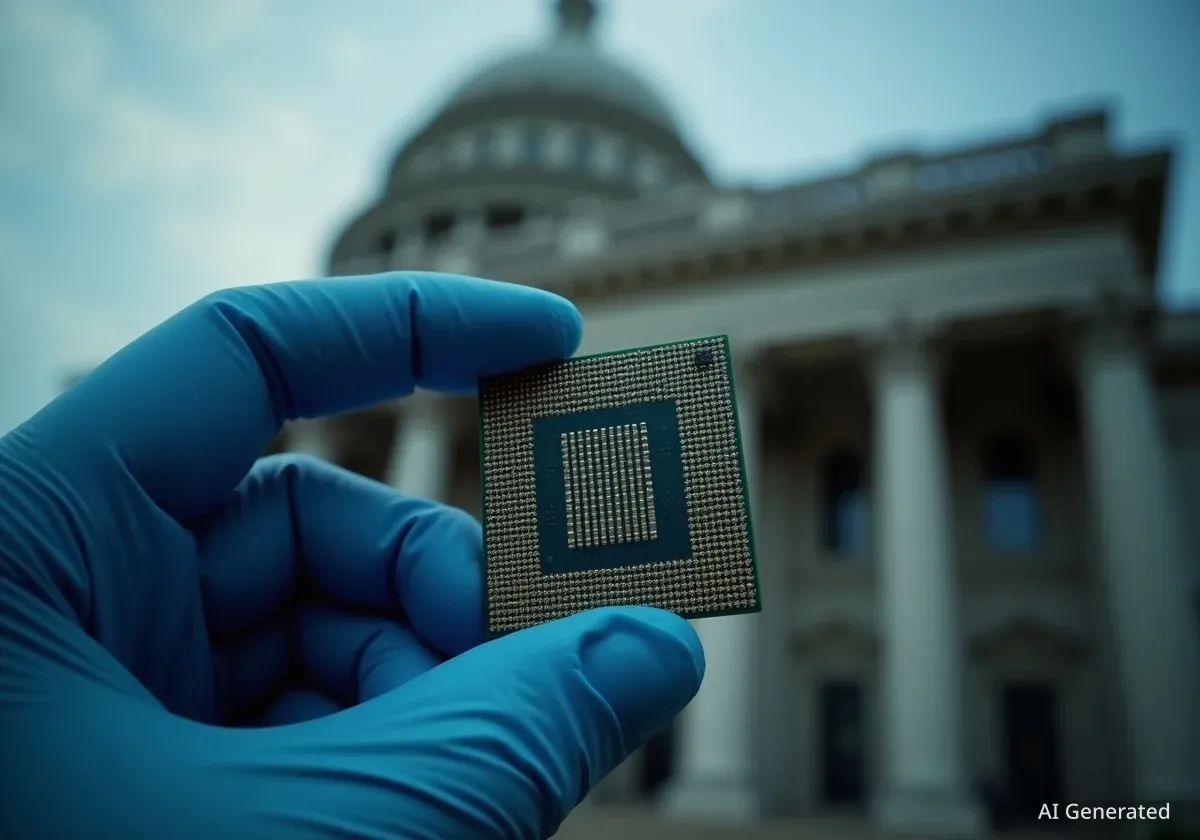The White House confirmed on Tuesday that Nvidia will not be permitted to sell its most advanced artificial intelligence chip, the Blackwell, to China. This decision reinforces the United States' ongoing strategy to limit Beijing's access to cutting-edge semiconductor technology.
The announcement clarifies the application of existing export controls to Nvidia's latest generation of AI hardware, signaling a continued firm stance on national security concerns related to advanced technology.
Key Takeaways
- The White House has officially stated that Nvidia's new Blackwell AI chip cannot be sold to China.
- This move is a continuation of existing U.S. export control policies aimed at restricting China's access to high-end AI technology.
- The decision impacts Nvidia, a leading designer of AI chips, and underscores the geopolitical tensions in the global semiconductor industry.
- The Blackwell chip represents a significant leap in processing power, crucial for developing large-scale AI models.
A Clear Message from Washington
In a direct statement on Tuesday, the White House affirmed its position regarding the sale of top-tier AI technology to China. The administration has made it clear that Nvidia's new Blackwell chip, considered one of the most powerful AI processors ever developed, falls under current export restrictions.
This is not a new policy but rather an extension of measures implemented over the past few years. The U.S. government has been systematically tightening controls on the export of advanced semiconductors and the equipment used to manufacture them, citing national security risks.
The primary concern is that this technology could be used to advance China's military capabilities, including the development of autonomous weapons systems, sophisticated surveillance, and advanced cyber warfare tools.
Background on U.S. Export Controls
The United States has progressively expanded its export control list to include advanced computing chips and semiconductor manufacturing equipment. These rules, primarily managed by the Department of Commerce, aim to slow China's progress in strategic sectors. Previous regulations have already impacted Nvidia's ability to sell earlier high-performance chips, like the H100 and A100, to Chinese entities.
The Significance of the Blackwell Chip
Nvidia's Blackwell architecture is not just an incremental upgrade; it represents a major advancement in AI computing power. Unveiled earlier this year, these chips are designed to handle the massive datasets and complex calculations required for training and running the next generation of artificial intelligence models.
The performance of these chips is critical for breakthroughs in areas like generative AI, scientific research, and large-scale data analysis. By restricting access to this hardware, the U.S. aims to create a technological gap between its capabilities and those of its strategic competitors.
Blackwell's Performance Leap
Nvidia's Blackwell platform offers a substantial increase in performance over its predecessors. It is engineered to power trillion-parameter AI models, a scale that was previously impractical. This level of power is what makes it a focal point of national security and export control discussions.
For companies in China, the inability to acquire these state-of-the-art chips means they must rely on less powerful alternatives or invest heavily in developing their own domestic technology, a process that could take many years to catch up.
Impact on Nvidia and the Global Market
Nvidia has previously acknowledged the impact of U.S. regulations on its business. China has historically been a significant market for the company, accounting for a substantial portion of its revenue. In response to earlier restrictions, Nvidia developed modified, lower-performance chips specifically for the Chinese market to comply with U.S. rules.
The latest clarification from the White House indicates that even these workarounds will be closely scrutinized. It is likely that any future chip designs intended for China will need to fall well below the performance thresholds set by the Commerce Department.
"The United States is not interested in selling Nvidia's advanced AI chip, known as the Blackwell, to China at this time."
This ongoing technology rivalry has created uncertainty in the global semiconductor supply chain. Companies outside of the U.S. and China are also affected, as they must navigate complex regulations to avoid secondary sanctions. The long-term effect could be a fragmentation of the technology world into separate spheres of influence, each with its own standards and supply chains.
The Broader Geopolitical Context
The decision on the Blackwell chip is a single move in a much larger strategic competition between the United States and China. This "chip war" is about more than just market share; it's about defining who will lead the next era of technological innovation.
The key areas of focus include:
- Artificial Intelligence: The U.S. seeks to maintain its lead in AI development, which is heavily dependent on advanced hardware.
- Military Modernization: Preventing advanced chips from being used in Chinese military applications is a top priority for U.S. defense planners.
- Economic Security: By controlling key chokepoints in the semiconductor supply chain, the U.S. aims to protect its economic interests and those of its allies.
As AI becomes more integrated into every aspect of the economy and national security, the control over the hardware that powers it will remain a central point of contention in international relations. The White House's firm stance on the Blackwell chip is the latest signal that this policy is not expected to change anytime soon.





